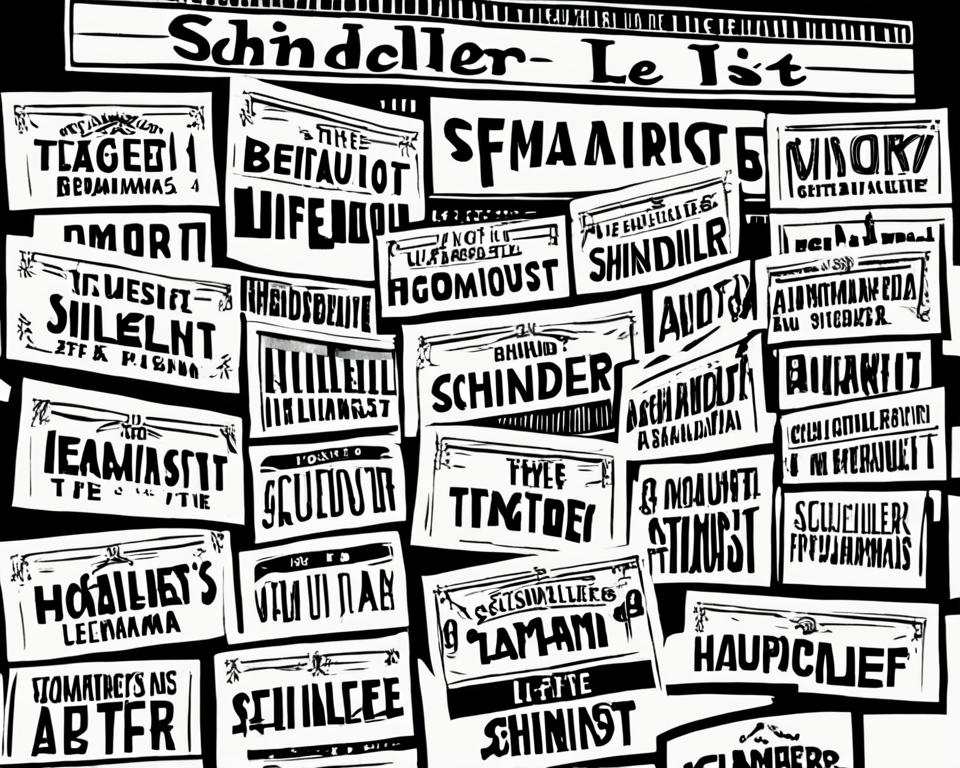Discover an array of powerful films that delve into the poignant and harrowing tales of the Holocaust. This curated list features a diverse range of movies, encompassing true stories and fictional narratives, shedding light on the various facets of this dark chapter in history. Whether you’re seeking documentaries or gripping dramas, these films offer different perspectives that provide a deeper understanding of the Holocaust experience.
Key Takeaways
- Explore a comprehensive list of movies about the Holocaust, offering profound insights into one of the darkest periods in history.
- From true stories of survival to fictional narratives capturing the human spirit, these films provide a range of perspectives and narratives.
- Discover documentaries and gripping dramas that tackle various aspects of the Holocaust experience.
- Witness the courage, resilience, and compassion of individuals who navigated through this tumultuous time.
- Gain a deeper understanding of the Holocaust through these captivating films that honor its impact on individuals and society.
Table of Contents
Woman in Gold (2015)
“Woman in Gold” is a captivating film that delves into the remarkable true story of Maria Altmann’s quest to reclaim her family’s possessions that were seized by the Nazis during World War II. At the heart of Maria’s fight is a renowned portrait of her beloved aunt, painted by the iconic Austrian artist Gustave Klimt.
The movie follows Maria’s relentless pursuit of justice and restitution, as she hires a young lawyer to help her navigate the complex legal battle. Through a series of flashbacks, the film also unveils the captivating history and significance of the painting, known as the “Woman in Gold.”
Directed by Simon Curtis, “Woman in Gold” masterfully intertwines Maria’s personal journey with larger themes of art, heritage, and the indomitable spirit of resistance against injustice. The film sheds light on the devastating impact of the Nazi seizure of art and the subsequent efforts to repatriate stolen cultural treasures.
Reclaiming the Past, Defying the Odds
Starring Helen Mirren as Maria Altmann and Ryan Reynolds as her determined lawyer, “Woman in Gold” showcases the emotional and legal challenges faced by Maria and her legal team. The film highlights the enduring significance of the artwork and the role it plays in preserving the memory of those affected by the Holocaust.
The courtroom scenes in the movie provide a glimpse into the complexity of the restitution process, as Maria and her lawyer navigate the Austrian legal system and confront the country’s reluctance to acknowledge its complicity in the Nazi crimes. The film raises thought-provoking questions about the morality of art ownership and the responsibility to preserve cultural heritage.
The Legacy of “Woman in Gold”
“Woman in Gold” not only educates viewers about a lesser-known aspect of the Nazi regime’s crimes but also pays homage to the resilience of those who fought for justice and refused to let their history be erased. Maria Altmann’s story serves as a testament to the power of art in preserving memory and reclaiming stolen identities.
The film received critical acclaim for its exceptional performances, engaging storytelling, and exquisite cinematography that brings the captivating world of Gustave Klimt’s artistry to life. “Woman in Gold” is a powerful testament to the strength of the human spirit and a reminder of the deep-rooted impact of the Nazi seizure of art.
| Directed by | Simon Curtis |
|---|---|
| Starring | Helen Mirren, Ryan Reynolds |
| Release Date | 2015-04-03 |
| Running Time | 109 minutes |
The Book Thief (2013)
Based on the novel by Markus Zusak, The Book Thief transports us to Nazi Germany and tells the story of Liesel, a young girl who discovers solace amidst chaos through the power of literature. As Liesel navigates the horrors of the Holocaust, she finds refuge in stealing books and sharing them with a Jewish refugee hiding in her basement.
This critically acclaimed film beautifully captures Liesel’s journey of resilience and the transformative importance of storytelling in the face of adversity. By immersing ourselves in Liesel’s world, we gain a deeper understanding of the profound impact of the Holocaust on the lives of ordinary individuals.
The Book Thief not only highlights the horrors of Nazi Germany but also illuminates the indomitable human spirit that can emerge even in the darkest of times. The film serves as a poignant reminder of the enduring power of literature and the ability of words to shape and empower us.
| Director | Main Cast | Release Year |
|---|---|---|
| Brian Percival | Sophie Nélisse, Geoffrey Rush, Emily Watson | 2013 |
Nicky’s Family (2011)
“Nicky’s Family” is an extraordinary film that tells the remarkable story of Sir Nicholas Winton, a true hero who saved the lives of 669 children during the Holocaust. Sir Nicholas, also known as the “British Schindler,” organized the Kindertransport, a rescue mission that brought Czechoslovakian children to safety in Britain. Through a combination of dramatic reenactments, archival footage, and heartfelt interviews with both the rescued children and Sir Nicholas himself, the film paints a vivid picture of the courage and compassion exhibited by those involved in this incredible rescue operation.
This powerful documentary not only pays tribute to Sir Nicholas Winton and the brave individuals who assisted him, but also sheds light on the immense impact of the Kindertransport on the lives of the rescued children and their families. It serves as a testament to the strength of the human spirit in the face of unimaginable adversity.
The Kindertransport
The Kindertransport was a life-saving initiative that allowed approximately 10,000 children, most of them Jewish, to escape Nazi-occupied Europe and find refuge in Britain. Sir Nicholas Winton, a British stockbroker, organized eight trains that transported children from Czechoslovakia to safety between 1938 and 1939. These children were often separated from their families and faced an uncertain future, but thanks to the Kindertransport, their lives were spared.
Sir Nicholas Winton: A Hero’s Legacy
Sir Nicholas Winton remained modest about his heroic actions for decades, rarely discussing his role in the Kindertransport. It was not until the late 1980s that his extraordinary story came to light when his wife found a scrapbook documenting the names and photographs of the children he had helped rescue. Since then, Sir Nicholas has been honored worldwide for his selflessness and determination in the face of grave danger.
| Key Points | Details |
|---|---|
| Rescue Mission | Sir Nicholas Winton organized the Kindertransport, saving the lives of 669 children from Nazi-occupied Czechoslovakia. |
| Documentary Format | “Nicky’s Family” combines reenactments, archival footage, and interviews to bring this incredible rescue mission to life. |
| Impact on Rescued Children | The film explores the lasting impact of the Kindertransport on the lives of the rescued children and their families. |
| Sir Nicholas Winton’s Legacy | Sir Nicholas received international recognition for his heroic actions, becoming known as the “British Schindler.” |
Sarah’s Key (2010)
Sarah’s Key is a powerful film that intertwines two narratives, shedding light on a lesser-known aspect of the Holocaust and its lasting impact on individuals and families. Set in Paris during World War II, the film explores the Vel d’Hiv Roundup, a tragic event where thousands of Jewish families were arrested by French authorities.
In one narrative, we follow the harrowing journey of a young girl named Sarah, who locks her younger brother in a closet to protect him during the roundup. The film depicts her desperate efforts to reunite with her brother and the unimaginable sacrifices she makes along the way.
In the present day, a journalist named Julia Jarmond becomes intrigued by Sarah’s story and sets out to uncover the truth. As she delves deeper into the history of the Vel d’Hiv Roundup, Julia uncovers shocking revelations that not only impact Sarah’s fate but also her own life.
Through the poignant performances of the cast and the expert storytelling, Sarah’s Key showcases the resilience of the human spirit and the profound and often devastating consequences of historical events. It raises important questions about memory, responsibility, and the moral complexities surrounding the Holocaust.
Key Highlights of “Sarah’s Key”
- The film provides an emotional portrayal of the Vel d’Hiv Roundup, a significant but lesser-known event during the Holocaust.
- The dual narratives offer a unique perspective, highlighting the ongoing impact of the roundup on both past and present generations.
- Sarah’s Key explores themes of guilt, remembrance, and the complexities of historical memory, provoking thoughtful reflection on society’s responsibility to confront and learn from the past.
- The performances, particularly by the young actress portraying Sarah, evoke a genuine sense of empathy and engagement from the audience.
| Director | Gilles Paquet-Brenner |
|---|---|
| Screenplay | Gilles Paquet-Brenner |
| Based on | Novel by Tatiana de Rosnay |
| Starring | Kristin Scott Thomas, Mélusine Mayance, Niels Arestrup |
| Release Date | 2010 |
Defiance (2008)
“Defiance” is a gripping film based on the true story of the Bielski partisans. In the midst of World War II, these courageous Eastern European Jews managed to escape the clutches of the Nazis and formed a resistance movement in the dense forests. The movie portrays their unwavering spirit and determination as they fought for survival and worked tirelessly to protect and save other Jews from the atrocities of the Holocaust.
The Bielski partisans, led by the brothers Tuvia, Asael, and Zus Bielski, defied the odds and established a community in the woods, determined to resist the Nazi occupation. Their group grew steadily as they provided shelter, food, and protection to those seeking refuge. With their remarkable resourcefulness, the partisans carried out acts of sabotage and launched daring raids to disrupt Nazi operations in the region.
This inspirational story of defiance and resistance showcases the indomitable spirit of the Bielski partisans and their unwavering commitment to preserving Jewish lives. Their brave efforts not only challenged the Nazis but also provided hope and inspiration to countless others facing persecution.
The Bielski Partisans’ Legacy
- The Bielski partisans managed to save around 1,200 Jewish lives during their time in the forests.
- Their community became self-sustaining, with its own infrastructure, schools, healthcare facilities, and even a courthouse.
- The partisans also actively engaged in sabotage and guerrilla warfare to disrupt Nazi supply lines and operations in the region.
“Defiance” is a testament to the resilience, courage, and determination of individuals in the face of unimaginable adversity. It highlights the untold stories of heroism and resistance during one of the darkest periods in human history, offering a powerful reminder of the strength of the human spirit and the importance of standing up against injustice.
The Pianist (2002)
Directed by Roman Polanski and based on the memoir of Wladyslaw Szpilman, The Pianist is a powerful film that delves into the horrors of the Holocaust and one man’s unwavering will to survive. Set in the Warsaw Ghetto during the Nazi occupation of Warsaw, the movie offers a gripping portrayal of the indomitable human spirit amidst unimaginable adversity.
At the heart of the story is Wladyslaw Szpilman, a gifted Polish-Jewish pianist whose life takes an unforeseen turn when the Nazis invade his city and confine the Jewish population to the Warsaw Ghetto. Through the lens of Polanski’s direction, viewers witness the harrowing conditions and constant fear faced by Szpilman and his fellow inhabitants.
Szpilman’s survival becomes a testament to human resilience as he navigates the treacherous landscape of the Warsaw Ghetto, witnessing the atrocities committed by the Nazis. Through determination, resourcefulness, and a stroke of luck, Szpilman manages to evade capture and hide in various locations throughout the city, relying on the kindness of strangers from time to time.
The film portrays the stark realities of life in the Warsaw Ghetto, depicting the inhumane treatment of its residents and the cruel tactics employed by the Nazis. It serves as a haunting reminder of the atrocities committed during the Holocaust and the strength individuals found within themselves to endure.
As the story unfolds, viewers are captivated by Szpilman’s incredible journey, feeling the weight of his desperation, hope, and ultimate triumph. The power of music, interwoven throughout the film, symbolizes Szpilman’s resilience and serves as a testament to the enduring nature of the human spirit in times of immense suffering.
The Pianist Cast:
The cast of The Pianist delivers outstanding performances, bringing the story to life with their talent and dedication. Notable actors include:
- Adrien Brody as Wladyslaw Szpilman
- Thomas Kretschmann as Captain Wilm Hosenfeld
- Frank Finlay as Father
- Maureen Lipman as Mother
| Movie Details | |
|---|---|
| Director: | Roman Polanski |
| Writer: | Ronald Harwood |
| Release Date: | 2002 |
| Genres: | Drama, War, Biography |
| Runtime: | 2h 30min |
| Awards: | Academy Award for Best Actor (Adrien Brody), Palme d’Or |
Conclusion
Discover some of the best Holocaust movies and documentaries that provide powerful insights into one of the darkest periods in history. These films offer a range of perspectives, from true stories of survival to fictional narratives that capture the indomitable human spirit. Whether you’re seeking to learn more about the atrocities of the Holocaust or the inspiring resilience of its survivors, these movies deliver compelling narratives and thought-provoking storytelling.
Explore the depths of human courage and the impact of the Holocaust with these films. From “Woman in Gold” that chronicles Maria Altmann’s legal battle to reclaim her family’s stolen artworks, to the powerful depiction of life in Nazi Germany through the eyes of Liesel in “The Book Thief,” each film tackles different aspects of this tragic chapter in history.
Witness acts of heroic kindness and defiance in the face of overwhelming adversity in movies like “Nicky’s Family” and “Defiance.” These films tell the captivating stories of individuals who risked their lives to rescue Jewish children and fight against the Nazis. Meanwhile, “Sarah’s Key” sheds light on the lesser-known Vel d’Hiv Roundup and its long-lasting consequences on individuals and families.
Finally, dive into the haunting journey of survival and resilience with “The Pianist,” based on the memoir of Wladyslaw Szpilman, a Polish-Jewish pianist who defied all odds during the Warsaw Ghetto and Nazi occupation. Each of these films contributes to a deeper understanding of the Holocaust and the experiences of those involved.


